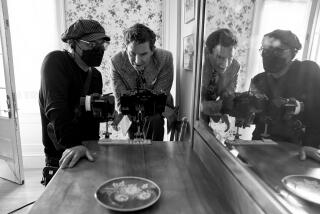Smoking Scenes Butt of Audience’s Anger
- Share via
BOULDER, Colo. — When the lights dim at the Boulder Dinner Theater, the cast of “Grand Hotel” lights up, putting artistic freedom at odds with Boulder’s five-month-old ordinance banning smoking in public buildings.
Theater owner Ross Haley has been told to comply with the ban--or face up to 90 days in a county jail and $1,000 in fines.
“I’m surprised Boulder has done what they’ve done, and how they’re doing it,” Haley said. “It’s been a miserable, degrading experience. I never thought I would be treated like I have over this.”
Boulder Environmental Enforcement Officer Terry Steinborn said several theatergoers had complained about the smoking scenes in “Grand Hotel,” which is set in decadent 1928 Berlin.
Steinborn said Haley was told at the end of March that the actors would have to find a way to create the illusion of smoking.
One option might be tobacco-less cigarettes that emit nontoxic smoke, but Haley said they tried that in the past, “and it smells like marijuana.”
“We actually had the Boulder Police Department out here because one of the patrons in the show got up and called the police. They were ready to raid us,” Haley said.
Cutting out the scenes also isn’t an option. Federal law prohibits changing a manuscript without the copyright holder’s written permission, and violations can result in litigation.
The smoking scenes--about one minute in the two-hour show--are vital to the ambience, said Haley.
“If someone really is affected by it and wants to leave, I would be happy to return their money,” he said. “I’m here to entertain people, not to make people mad.”
The musical debuted Feb. 29, and Haley said no one has asked for a refund yet. He also said he doesn’t plan any script changes before the musical completes its run at the 300-seat Boulder Dinner Theater in June.
Allen Hussung, of Samuel French Inc. of New York City, which owns the rights to “Grand Hotel,” said the company often concedes to requests for manuscript changes that come from high schools or community theater groups intent on eliminating profanity or controversial material.
“We get them all the time,” Hussung said. “It’s so funny. In these censorious times, everyone goes home and sits around the dinner table and talks about how great it is to live in a free country.”
More to Read
The biggest entertainment stories
Get our big stories about Hollywood, film, television, music, arts, culture and more right in your inbox as soon as they publish.
You may occasionally receive promotional content from the Los Angeles Times.










